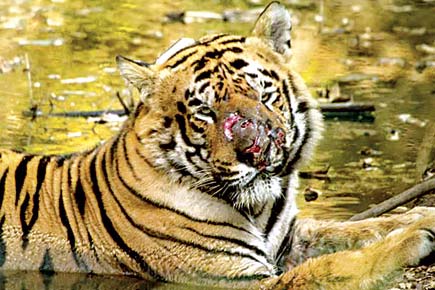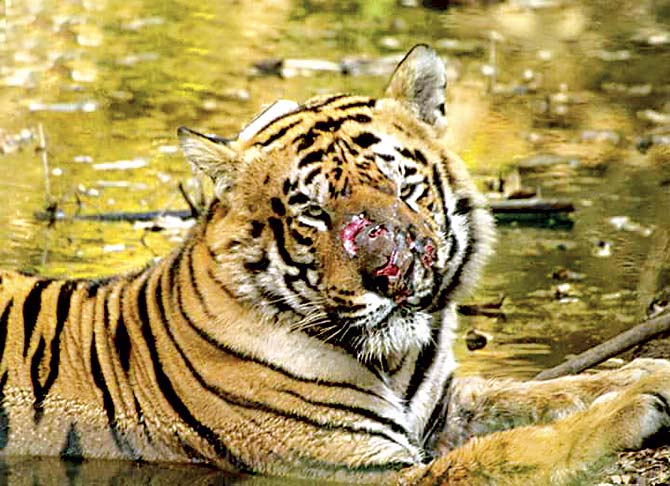Researchers were concerned after the 8-year-old tiger got injured in a fight a month ago, since he is the only male tiger that has been radio collared at the Tadoba Andhari Tiger Reserve

Even the king of the jungle has to fight hard to stay on top, and it is no different for Gabbar, the 8-year-old tiger who, at a hefty 185 kg, is the undisputed king of the Tadoba Andhari Tiger Reserve (TATR).

This picture of the injured Gabbar was posted on the Facebook page of the tiger reserve after it was clicked on March 8. Since his injury, Gabbar has resumed normal activity. Pic/Lawrence Bruce Kekuke
With age setting in, however, Gabbar is getting tough competition from rival males and was injured in a fight last month. But unlike his namesake in the cult film Sholay, everyone has been rooting for Gabbar the tiger to make a speedy recovery, since he holds great promise for researchers at Tadoba.
Gabbar is one of the two tigers that have been radio collared and are being monitored by researchers so we can better understand the big cat’s behaviour. Much to the authorities’ relief, Gabbar made a natural recovery without any human intervention and is now back on the prowl in his territory.
TATR field director Prahlad Garad said, “We were a little worried last month when one of our radio-collared tigers was found with injures on his face. We had a discussion about whether we should tranquilise the animal for treatment or not. But after monitoring the animal’s movement, we came to the conclusion that there was no need for him to be tranquilised. Gabbar has recovered naturally from his injuries and is even hunting properly.”
The struggle for power is far from over for Gabbar though, as sources from the tiger reserve said that due to his advancing age, Gabbar might be pushed out of his territory by younger, stronger males. This is just a matter of time, which is why it is important that the experts not waste even a single opportunity to study the tiger and his activities.
Apart from the fact that Gabbar showed promise of getting better on his own, researchers did not want to tranquilise him as it would have interrupted the ongoing data collection process from his radio collar. Dr Bilal Habib from the Wildlife Institute of India (WII) who had radio-collared Gabbar and the female tiger, Tara in October last year, will study the duo for a year, until the collar’s batteries run out.
Experts hope to understand prey segregation amongst males and females so that they can explain the weight difference between the two – Tara’s weight is 85 kg and Gabbar’s is 185 kg, a full 100 kg more. The researchers also plan to collar two leopards and a dhole (wild dog) in the same area to know how tigers, leopards and dholes move in the same area and how they segregate in terms of space and time.
Scientist Dr Bilal Habib from WII said, “In cats it is the pouncing effect that subdues the prey and through the collaring study that we are doing, we may get the segregation data about the prey. We may also get details like what is the choice prey of a male tiger and that of a female. We want to study this factor also because there is a huge difference between the body weight of a male tiger and that of a female.”
 Subscribe today by clicking the link and stay updated with the latest news!" Click here!
Subscribe today by clicking the link and stay updated with the latest news!" Click here!









